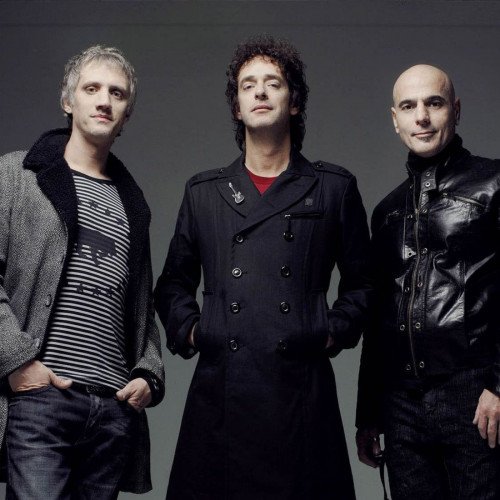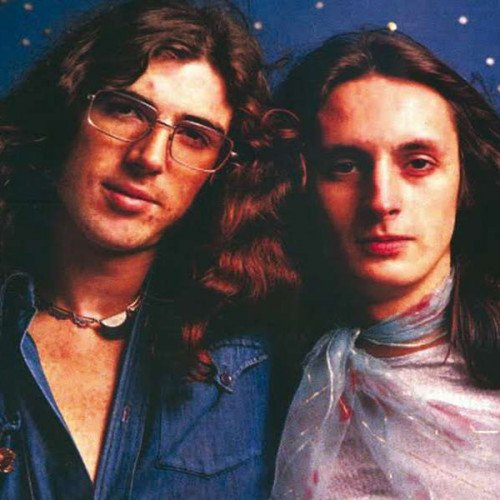The greatest rock band in Argentina "Soda Stereo" vs "Sui Generis"

Soda Stereo
Soda Stereo was an Argentine rock band created in Buenos Aires in 1982. It achieved international success throughout the 1980s and 1990s, and the group is regarded as the most important and influential Spanish-language band ever and a legend in Latin music. The power trio consisted of Gustavo Cerati (lead vocals, guitars), Héctor "Zeta" Bosio (bass), and Charly Alberti (drums). Soda was part of a renewal in Argentina's rock scene, coinciding with the return of democracy at the beginning of the 1980s with its attending optimism and the birth of other history-making acts such as Virus, Zas, Sumo, Los Abuelos de la Nada, Los Fabulosos Cadillacs, and Los Enanitos Verdes. Soda's early sound was influenced by new wave bands such as the aforementioned Virus, the Police, Elvis Costello and post-punk bands such as Television (this influence particularly demonstrated in Soda's early works, e.g. Soda Stereo (1984), Nada Personal (1985), Signos (1986), and Doble Vida (1988)). The band gradually evolved into a heavier-sounding alternative rock band, eventually drawing influences from neo-psychedelia, classic rock, progressive rock, shoegaze, britpop, and electronic music, particularly with the albums Canción Animal (1990), Dynamo (1992), and Sueño Stereo (1995). By acclaim, Soda Stereo is largely considered one of the greatest bands in the history of Latin rock. At almost 6 million listeners, they are the best-selling band in the history of Argentina, setting landmarks in record sales and concert attendances. In Latin America alone, the band sold over 17 million albums in their 15-year career – this number has since continued to rise following the separation of the band.After the band's separation, all three of its members found separate endeavours – Gustavo Cerati continued a successful solo career after the band's split, releasing four studio albums (most of which achieved Platinum and Gold status in Argentina; see his discography for more information), while Zeta Bosio worked for a time as bassist for several underground groups and is now touring as a DJ; Charly Alberti has also found moderate success, both with the foundation of his CybeRelations company, and his family band MOLE. In 2014, Cerati died of cardiac arrest after four years in a stroke-induced coma, signalling the official end for the band as a trio. In 2020, Bosio and Alberti embarked on a reunion tour under the Soda Stereo moniker across North and South America: titled Gracias Totales, it features several guest singers, among them Cerati's son Benito, Richard Coleman, Mon Laferte, Juanes, and others. Following the COVID-19 pandemic, the tour is currently on hiatus.
Statistics for this Xoptio

Sui Generis
Sui Generis is one of the most influential rock bands in Argentine history, enjoying enormous success and popularity during the first half of the 1970s and a following that lasts to the present throughout South America. Sui Generis disbanded on September 5, 1975 and, despite concerts that took place in 1980 and 2001, a permanent re-formation has been ruled out. Sui Generis was formed in 1969 from the merger of two bands: To Walk Spanish, originally led by Charly García and The Century Indignation, originally led by Nito Mestre. The newly formed band's members were Charly (piano), Nito (flute), Alberto Rodríguez (drums), Alejandro Correa (bass guitar) (later replaced by Rolando Fortich), Juan Carlos Bellia (guitar) and Carlos Piégari (guitar and vocals). In its early life, Sui Generis experimented with psychedelic music but would eventually refine and change its sound and is now generally classified as folk-rock. Infamously, at Sui Generis' first big performance, none of the members but Charly and Nito appeared. Despite the poor showing, they went ahead with the show, García playing the piano, with Nito accompanying on the flute. Amazingly, the audience still loved them. García's simple songs of adolescence contained substantial poetic elements that showed through the limited instrumentation. After this they decided to continue as a duet with Charly composing songs and playing the piano, Nito playing the flute and both at vocals and guitar. Soon after Sui Generis started to gain fame, García, then 20 years old, had to take a break from the band to fulfill his mandatory military service. Unhappy in the service, he pulled outrageous stunts, such as reportedly taking a corpse in a wheelchair for a walk in the sun because "he was too pale". Eventually, García swallowed a large dose of amphetamines and faked a heart attack, in an apparent attempt to cut short his military service. Garcia was hospitalized, and it was there that he composed two of the band's most famous songs: "Botas Locas" ("Crazy boots"), censored when first released, and "Canción para mi muerte" ("Song for my death"). Garcia was released from the military due to "mental health problems". In 1972, Sui Generis released its first LP, Vida (Life), which became instantly popular, especially among Argentinian teenagers. Confesiones de Invierno (Winter Confessions), their second LP, was released in 1973. This album had higher production values and better studio equipment and was also a huge commercial success.